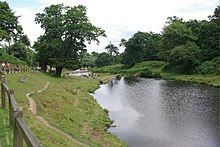Bradgate Park and Cropston Reservoir is a 399.7-hectare (988-acre) geological Site of Special Scientific Interest north–west of Leicester. It is also a Nature Conservation Review site,[1][2] and Bradgate Park contains Geological Conservation Review sites[3][4] and a Scheduled Monument.[5]
| Site of Special Scientific Interest | |
 The River Lin in Bradgate Park | |
| Location | Leicestershire |
|---|---|
| Grid reference | SK 533 106[1] |
| Interest | Biological Geological |
| Area | 399.7 hectares[1] |
| Notification | 1988[1] |
| Location map | Magic Map |
Bradgate Park has one of the best examples of ancient parkland in the county, and Cropston Reservoir has unusual plants on its shores. The park has Charnian rocks dating to the Ediacaran period around 600 million years ago, and it has provided the type section for four different members of the stratigraphic sequence. It is described by Natural England as "a site of great importance to the study of Precambrian palaeontology".[6][7]
There are footpaths through the park and around the reservoir.
References
edit- ^ a b c d "Designated Sites View: Bradgate Park and Cropston Reservoir". Sites of Special Scientific Interest. Natural England. Retrieved 17 September 2017.
- ^ "Map of Bradgate Park and Cropston Reservoir". Sites of Special Scientific Interest. Natural England. Retrieved 17 September 2017.
- ^ "Bradgate Park (Precambrian of England & Wales)". Geological Conservation Review. Joint Nature Conservation Committee. Retrieved 8 August 2017.
- ^ "Bradgate Park (Quaternary of Midlands - Avon)". Geological Conservation Review. Joint Nature Conservation Committee. Retrieved 8 August 2017.
- ^ Historic England. "Bradgate Park (1000958)". National Heritage List for England. Retrieved 8 August 2017.
- ^ "Bradgate Park and Cropston Reservoir citation" (PDF). Sites of Special Scientific Interest. Natural England. Archived from the original (PDF) on 21 September 2015. Retrieved 17 September 2017.
- ^ "Charnian Supergroup". The BGS Lexicon of Named Rock Units — Result Details. British Geological Survey. Retrieved 17 September 2017.